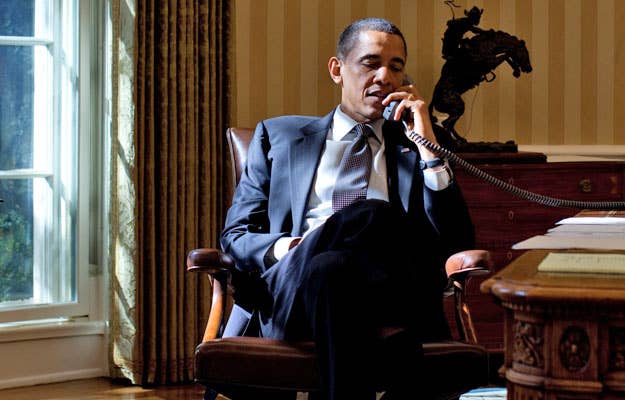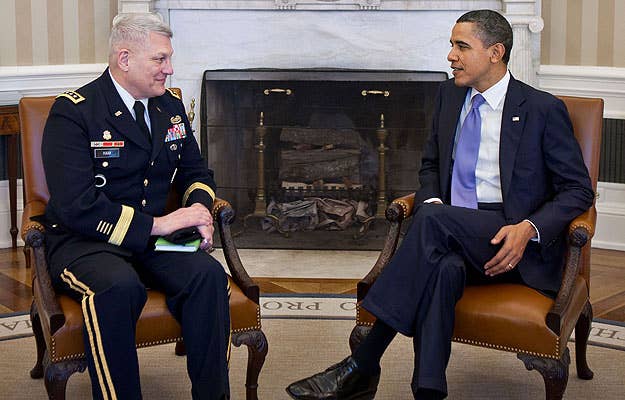
The Supreme Court could turn Barack Obama's reversal on the handling of the Defense of Marriage Act from a legal maneuver into a campaign issue this fall, if it agrees to hear a defining case on the matter in the coming year.
Much of the coverage and criticism of the White House relating to marriage has been over Obama's personal support for marriage equality, announced earlier this year. But the 180-degree turn with legal force centered on the Administration's handling of court challenges to the 1996 law defining marriage in federal law as consisting of only one man and one woman.
Attorney General Eric Holder announced in February 2011 that Obama had changed his mind on the law and his administration would no longer be defending it in court, and now Obama's lawyers could be at the helm of the opposition to the law if, as expected, the Supreme Court takes the case.
"The DOMA case will be viewed as one of handful of very major cases that will get tons of attention," said Paul Smith, the partner at Jenner & Block who successfully argued the Supreme Court's last big case addressing the rights of gay people — striking down states' sodomy laws as unconstitutional.
Obama campaigned on complete opposition to the Defense of Marriage Act, a contrast with Hillary Clinton, who only backed partial repeal. But on June 11, 2009, the Department of Justice filed a brief defending DOMA’s constitutionality in a case challenging the law. Far too strong for many lesbian, gay, bisexual and transgender supporters of the president, the brief caused a backlash that included bloggers, members of Congress, and the president of the Human Rights Campaign — the country’s largest LGBT rights lobbying group.
At one point in the brief, Administration lawyers argued that because gay people could marry someone of the opposite sex, “DOMA does not discriminate against homosexuals in the provision of federal benefits.”
Although the Administration toned down its language in later cases, its continued defense of the law left LGBT advocates unhappy with Obama. When several LGBT media journalists sat down with White House senior advisor Melody Barnes on July 1, 2010, she refused to answer whether Obama himself thought that the 1996 law defining “marriage” and “spouse” for all federal purposes was constitutional.
It wasn’t until later that year that Obama first described his views on marriage equality as “evolving,” which, although an advancement welcomed by LGBT advocates, had the practical effect of leading supporters of marriage equality — and the media — to ask the president, “Evolved yet?”

The president finally answered the question about DOMA’s constitutionality on Feb. 23, 2011. With support from Attorney General Eric Holder, Obama decided that laws that classify people based on sexual orientation should be reviewed by courts with “heightened scrutiny” like that given to sex- or race-based classifications. Under that standard, Holder wrote to House Speaker John Boehner (R-Ohio), DOMA is unconstitutional and DOJ would no longer defend it in court.
The letter to Boehner dramatically altered the political landscape for DOMA, but it wasn’t until July 1, 2011, that the Obama administration explained in court exactly why DOMA should be found unconstitutional. DOJ lawyers acknowledged in federal court employee Karen Golinski’s challenge seeking equal health insurance benefits for her wife that “[t]he federal government has played a significant and regrettable role in the history of discrimination against gay and lesbian individuals.”
The DOJ brief went on to detail a Senate investigation into “the employment by the Government of homosexuals and other sexual perverts,” President Eisenhower’s executive order adding “‘sexual perversion’ as a ground for investigation and possible dismissal from federal service,” and the FBI and State Department’s “zealous” enforcement of the order to “purge gays and lesbians from the federal civilian workforce.”
In April, DOJ sent one of its top lawyers to argue against DOMA’s constitutionality in court. Acting Assistant Attorney General Stuart Delery successfully argued the point to the First Circuit Court of Appeals in Boston against Paul Clement, the former George W. Bush administration lawyer hired by the House Republican leaders to defend the law after DOJ stopped doing so.
Then, on July 3, when the Obama administration asked the Supreme Court to hear these cases and declare, once and for all, that DOMA’s federal definition of marriage was an unprecedented and unconstitutional violation of the rights of all Americans to — as First Lady Michelle Obama has put it — “love whomever we choose.”
In a pair of filings — in Golinski’s case and the case out of Boston — the Obama administration asked the high court to take the cases because, “Authoritative resolution … is of great importance to the United States … and tens of thousands of others who are being denied the equal enjoyment of the benefits that federal law makes available to persons who are legally married under state law.”
In late September or early October, the Supreme Court likely will announce whether it is hearing the case and, though House Republicans are defending the law, the changed position of the Obama administration will be an unavoidable visual and legal cue to the justices.
